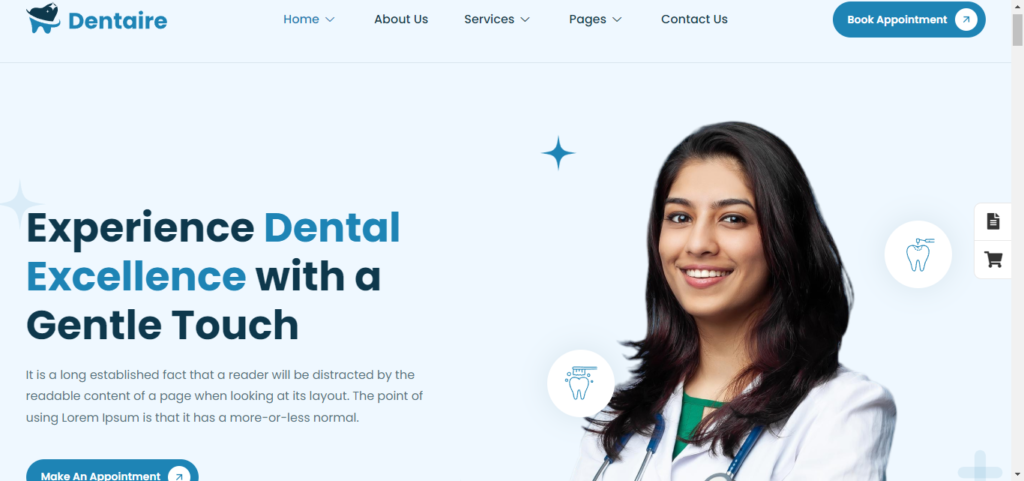
In the competitive world of dentistry, having an optimized, visually appealing, and user-friendly website can make a significant difference in attracting new patients and retaining existing ones. A dental website designer specializes in creating bespoke websites that reflect the uniqueness of your practice while meeting the specific needs of the dental industry. In this article, we will explore the importance of dental websites, what makes a great one, and how working with an expert designer can benefit your practice.
Why Your Dental Practice Needs a Website
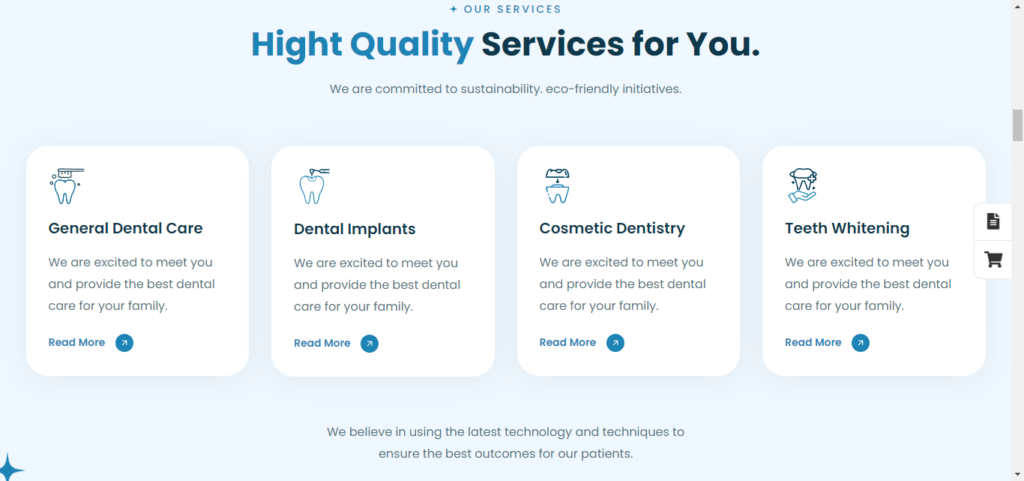
In today’s digital landscape, a professional, high-quality website is no longer a luxury—it’s a necessity. Potential patients often search online for dental services before making an appointment, and your website is their first impression. A poor website design could turn them away, while an excellent one can establish trust and credibility. Here’s why a great dental website matters:
First impressions matter: Your website is the first thing prospective patients see, and it influences their perception of your practice.
Patient convenience: A well-designed site offers online booking, patient forms, and educational resources, enhancing the patient experience.
SEO advantage: A dental website optimized for search engines helps your practice rank higher, attracting more local patients.
The Role of a Dental Website Designer
A dental website designer goes beyond typical web development by incorporating knowledge of the dental industry. These specialists understand the elements necessary to create websites that not only look good but also convert visitors into patients. Here’s what a dedicated designer does for dental practices:
1. Custom designs: tailored to your brand and the specific needs of a dental practice.
2. Mobile responsiveness: Ensures your website works seamlessly on any device.
3. SEO optimization: Targets dental-specific keywords, like “dental services in [your city],” to help you rank higher on search engines.
4. User experience (UX) design: Simplifies navigation so patients can easily find information or book appointments.
5. Integration of dental software: Incorporates tools like online booking systems and patient management software directly into your website.
Key Features of an Effective Dental Website
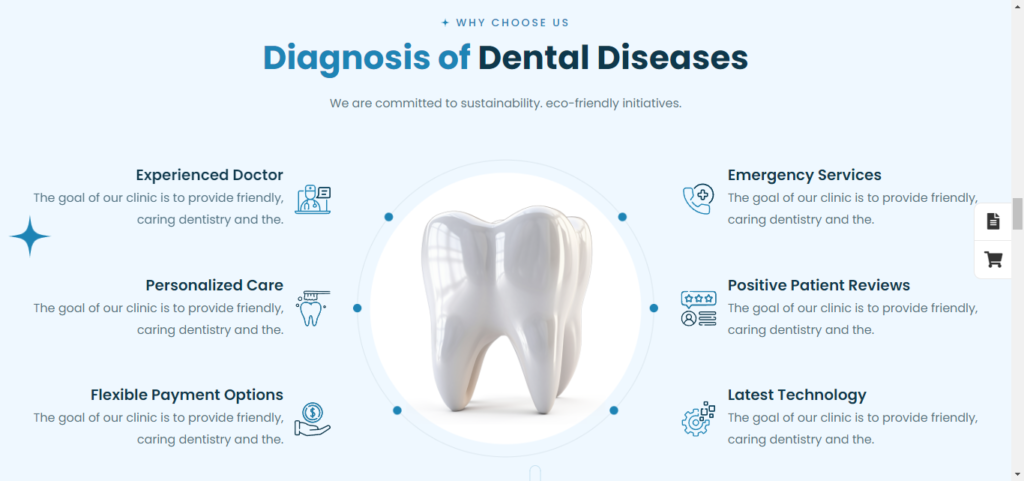
A high-converting dental website has several essential features designed to meet user intent and deliver value:
Visually Appealing Design: A clean, modern layout with professional images of your practice helps build trust.
Clear Call to Action (CTA): Encourage visitors to take immediate action, such as booking an appointment or calling your office.
Patient Reviews: Displaying patient testimonials builds social proof and confidence.
Service Pages: Dedicated pages for each service, like teeth whitening, dental implants, and cosmetic dentistry, improve SEO and user navigation.
Blog Section: Providing valuable content, such as oral hygiene tips or new technologies in dental care, helps educate patients and improve search rankings.
Fast Loading Speed: Website speed is crucial for user experience and SEO ranking.
SEO for Dental Websites
SEO (Search Engine Optimization) is essential for ensuring that your dental website ranks high in search results. Working with a dental website designer ensures that your site will be optimized for relevant search queries, helping your practice to stand out in your local market. Here’s how it’s done:
1. Keyword Optimization: Keywords like “best dentist in [city]” or “cosmetic dentistry [city]” are essential for attracting local searches. A designer will incorporate these into headings, content, and metadata.
2. Local SEO: Optimizing for local searches is crucial for dental practices. Including location-based keywords and Google My Business integration helps your practice appear in local search results.
3. Content Optimization: A dental website should have engaging and informative content that answers common patient questions, such as what to expect from procedures or how to maintain oral health.
Why Hire a Dental Website Designer Instead of a General Web Designer?
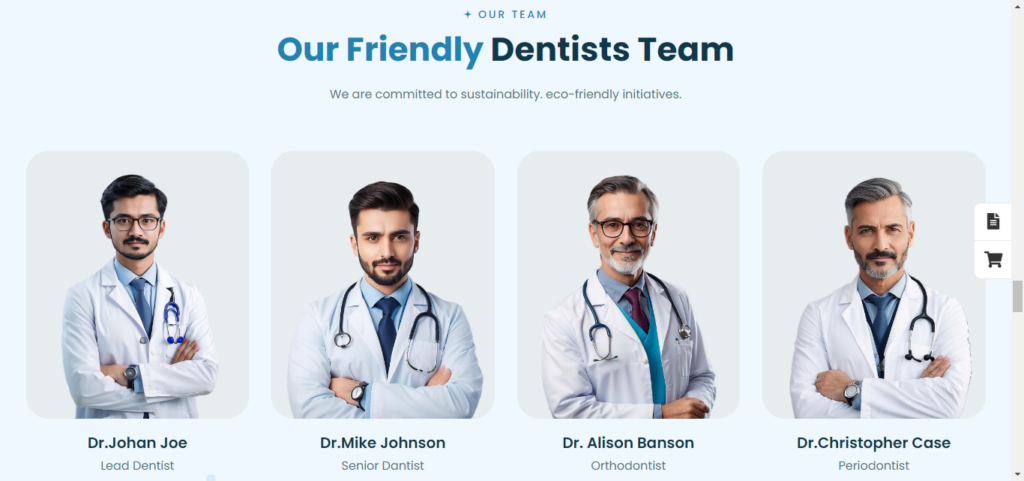
While many web designers can create beautiful websites, a dental website designer brings specialized expertise that benefits your practice in the following ways:
Industry-Specific Knowledge: Dental website designers understand patient behaviors and know how to create layouts and content that speak directly to dental patients.
Compliance: They are familiar with HIPAA regulations and ensure that patient information is handled securely online.
Focus on Conversion: Dental websites need to not only look good but also convert visitors into patients by offering the right features, such as easy appointment scheduling and clear service descriptions.
How a Dental Website Can Increase Patient Appointments
A well-designed website is one of the most powerful marketing tools for attracting new patients and keeping your schedule full. Here’s how it works:
1. Online Appointment Scheduling: Providing an easy, user-friendly online booking system removes barriers to making an appointment.
2. Educational Content: Offering information about dental procedures reassures patients and encourages them to book.
3. Optimized for Local SEO: With proper SEO, your website will show up when people in your area search for dental services, increasing traffic.
4. Patient Engagement: Features like chatbots, patient portals, and social media integration increase patient interaction and loyalty.
What to Expect When Working with a Dental Website Designer
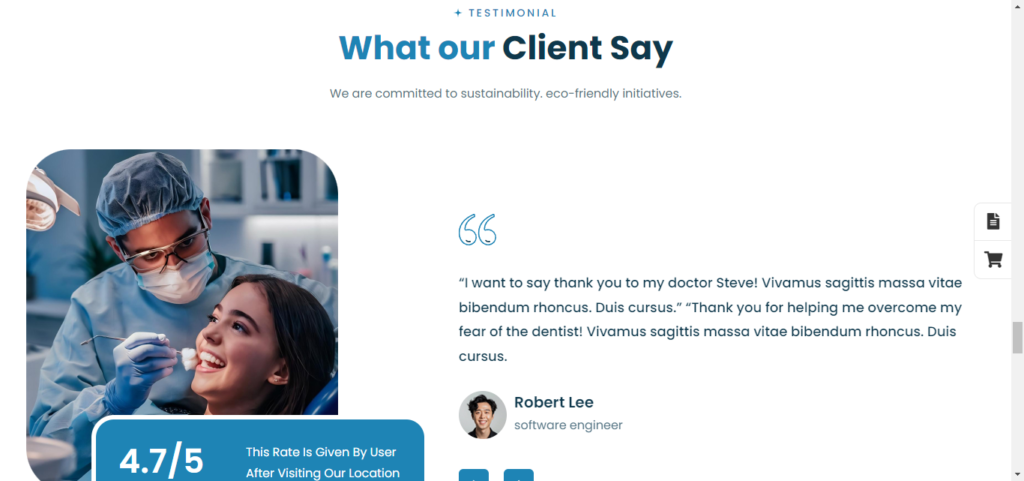
When you hire a dental website designer expect a collaborative process that focuses on your goals and vision for your practice. Here’s what the process typically looks like:
1. Consultation: The designer will meet with you to understand your brand, services, and target audience.
2. Design and Development: The designer will create a site that is both visually appealing and functional, incorporating the latest dental website trends.
3. SEO and Content Creation: The designer will optimize the site for search engines and, if necessary, create original content or recommend best practices for content updates.
4. Testing and Launch: Once the website is complete, it will be tested on different devices and browsers before going live.
5. Ongoing Maintenance: Dental websites require regular updates to keep up with technology, SEO trends, and your practice’s changing needs.
FAQs About Dental Website Design
1. What makes a dental website different from other websites?
Dental websites need to cater to the specific needs of dental patients, including features like online booking, patient forms, and educational content about dental services. They should also be compliant with healthcare privacy laws like HIPAA.
2. How much does it cost to hire a dental website designer?
The cost of hiring a dental website designer can vary depending on the complexity of the website, the features included, and ongoing SEO or maintenance services. Prices typically range from $500 to $10,000.
3. Can I manage my dental website myself?
Yes, many dental website designers create sites using user-friendly platforms like WordPress, which allows you to manage and update the content. However, ongoing SEO and technical maintenance are often best left to professionals.
4. How long does it take to build a dental website?
The timeline depends on the complexity of the website and the availability of content. A standard dental website can take anywhere from 4 to 8 Days to complete.
5. What SEO strategies work best for dental websites?
Local SEO is crucial for dental practices, as patients typically search for services nearby. Using location-based keywords, optimizing Google My Business listings, and generating patient reviews are all effective strategies.
6. Can I add online booking to my dental website?
Yes, many dental website designers can integrate online booking systems directly into your website, making it easier for patients to schedule appointments.
7. How do I ensure my dental website complies with HIPAA?
A professional dental website designer will ensure that your site is HIPAA-compliant by securing patient data, providing secure forms, and implementing encryption where necessary.
8. What kind of content should a dental website include?
Your website should include service pages for each dental procedure you offer, patient testimonials, a blog with oral health tips, and clear CTAs for appointment scheduling.
9. How do I get my dental website to rank higher on Google?
Hiring a designer who specializes in SEO will help you optimize your website for dental-related keywords, ensure fast loading times, and build local citations to improve your ranking.
10. Do dental websites need to be mobile-friendly?
Absolutely! Most users will access your site from a mobile device, and Google favors mobile-responsive websites in search rankings.
Conclusion
Investing in a professional **dental website designer** is essential for attracting new patients and growing your practice. By focusing on user experience, SEO, and the unique needs of dental patients, your website can become a powerful tool for increasing appointments and building long-term patient relationships.
